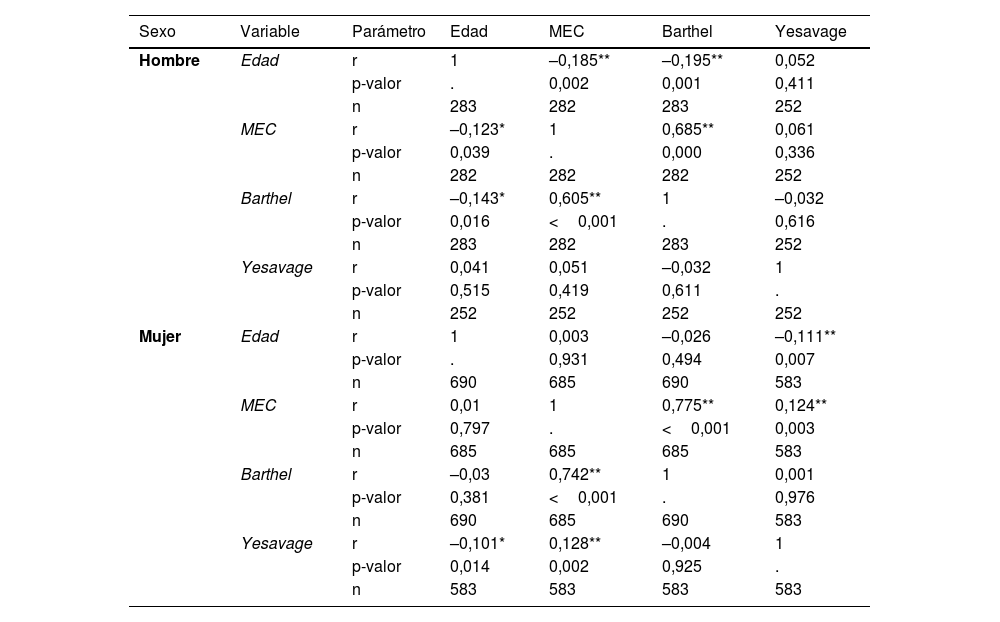Es necesario analizar el proceso de envejecimiento en adultos mayores institucionalizados. Con este propósito se llevó a cabo un estudio de análisis epidemiológico y descriptivo en residencias de adultos mayores antes de la pandemia por la COVID-19.
ObjetivoProporcionar una visión profunda del estado cognitivo (MEC), emocional (GDS) y funcional (Barthel Scale) de los adultos mayores participantes.
MétodoCon una muestra de 973 participantes se analiza la relación entre estado cognitivo, la vulnerabilidad a depresión y desempeño en las actividades de la vida diaria (DDA) para predecir el impacto de la comorbilidad de estas variables. Además de la distribución general de la muestra en las dimensiones mencionadas anteriormente, se analizaron diferencias según el género, la edad, el nivel educativo y el área geográfica.
ResultadosLos resultados confirman la hipótesis: un estado cognitivo deteriorado se asocia a mayores niveles de depresión y menor capacidad funcional. Las puntuaciones del MEC tienen correlaciones positivas y significativas con Barthel y Yesavage. La relación entre la demencia y la autonomía se constata para ambos sexos, la relación entre demencia y depresión solo se observa en mujeres. El nivel educativo influye en las puntuaciones del MEC (a más educación, mejor desempeño) y en las del Barthel (a menor educación, mayor dependencia). Se encontraron diferencias significativas en función del área de ubicación de la residencia.
ConclusionesUn estado cognitivo más deteriorado se relacionaría con un mayor nivel de depresión y menor desempeño funcional en las actividades de la vida diaria.
It is necessary to analyze the aging process in institutionalized older people. For this purpose, a descriptive and analytical epidemiological study was carried out in nursing homes for older adults before the COVID-19 pandemic.
ObjectiveProvide an in-depth insight into cognitive (MEC), emotional (Geriatric Depression Scale), and functional (Barthel Scale) status within the older adult participants.
MethodA sample of 973 participants analyzed the relationship between cognitive status, vulnerability to depression, and autonomous performance in Daily Day Activities (DDA) to predict the impact of the comorbidity of these variables. Therefore, in addition to the general distribution of the sample in the previously mentioned dimensions, differences were analyzed according to gender, age, educational level, and geographic area.
ResultsThe results confirm the hypothesis that a more impaired cognitive state is associated with higher levels of depression and lower functional capacity. The MEC scores have positive and highly significant correlations with Barthel and Yesavage. The relationship between dementia and autonomy is observed for both sexes, while the relationship between dementia and depression is only observed in women. The educational level influences the MEC scores (the more education, the better performance) and the Barthel scores (the less education, the greater dependency). Statistically significant differences were also found depending on the area of residence location.
ConclusionsThe more deteriorated cognitive state will be associated with a higher level of depression and lower functional capacity in daily life activities.












